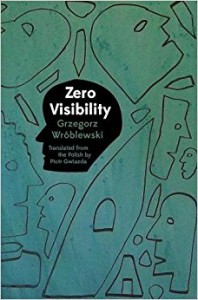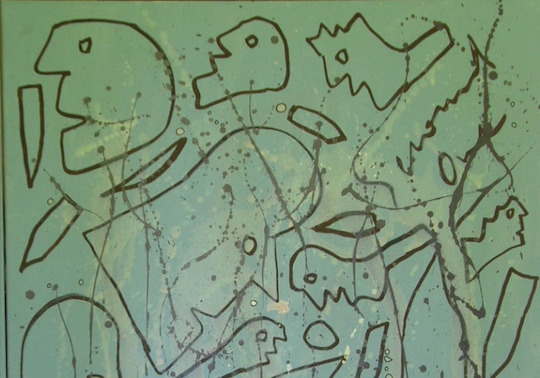While preparing to write this review, I came across an interview with Grzegorz Wróblewski in the Polish literary website Literacka Polska that began:
Rafał Gawin: For Polish readers, especially literary critics, it’s as if you’re a writer from another planet.
Grzegorz Wróblewski: Yes, it can seem that way from a certain distance. [My translation]
I think it’s safe to say the case is also true for English-speaking readers—Wróblewski’s most recent collection, Zero Visibility, translated by Piotr Gwiazda, really does feel like encountering a voice from a different world, albeit one that deals with all too real human (and often animal) concerns. Even on a surface reading it is clear that Wróblewski’s poems exhibit a remarkable range of tone, veering between seriousness and satire, surrealism and objectivity, grandiloquence and quiet, interior reflections. The first two poems, “Testing on Monkeys,” and “Makumba,” with their manic repetition and loud exclamations, are perhaps the two most frenetic and high-powered poems in the collection; they are suddenly followed by poems that are short and obscure, often dream-like and hallucinatory such as “The Great Fly Plague,” where “We abandoned our fingernails on the warm stones” or “Club Melon” which has “clones drinking juice made of organic, perfectly pressed worms”—poems that are at first disorientating, but at the same time openly invite the reader to attempt further interpretation.
Some of the best poems in the collection are the ones that, to put it bluntly, are about something recognisable, but also take time to construct and develop their ideas, such as “‘Bronisław Malinowski’s Moments of Weakness,”:
If I had a revolver, I’d shoot a pig!
A scholar’s clothes shouldn’t attract suspicions. Malinowski ordered
two Norfolk jackets from a tailor on Chancery Lane. Also a helmet
made of cork, with a lacquered canvas cover.
In one letter he wrote: Today I’m white with fury at the Niggers…
If I had a revolver, I’d shoot a pig!
His stay on the Trobriand Islands was pissing him off.
In spite of that, he became a distinguished anthropologist (27).
Another example is “Enhanced Interrogation Techniques,” a multilingual poem which examines methods of torture used at CIA black sites (one of them located in Poland) mixed with news about celebrities such as Tom Cruise and Angelina Jolie:
It wasn’t until he was 39 years old that Tom Cruise decided to straighten and
even out his teeth!
Later, the CIA used additional “enhanced interrogation techniques”
that included: długotrwała nagość (prolonged nudity), manipulacje żywieniowe
(dietary manipulation), uderzanie po brzuchu (abdominal slap).
Two small planes with Poles on board went down (31).
Wróblewski demonstrates how in a media-saturated age, where visibility is dependent not on importance, but on popularity, serious issues are constantly at risk of becoming trivialised or ignored. As the translator Piotr Gwiazda explains in his illuminating introductory note to the collection, Wróblewski relies much on found language in order to question “the mechanisms of news production and consumption” and creates “obsessively repetitive, unnervingly disjunctive texts.”
 (Phoneme Media, 2017).
(Phoneme Media, 2017).
On the other hand, some of the highlights in Zero Visibility are extremely short and playful, such as the use of parenthesis in “Minimalism”:
In the sorrow
of war
she found the road
to hope
(In theaters Friday) (37).
or the poem titled “$”:
The sun leans to the west
The wind ceases
at dusk
(How’s the dollar doing?) (45).
It’s impossible not to smile when reading these poems, the way the last lines sabotage the sentimental earnestness of what precedes them. Yet at the same time, Wróblewski is making an important point about how these images have become commodified, first with film and then the concern with currency stability at the close of a business day (associating “the west” with the “West”). The joke falls on all of us. However, not all the humor in Wróblewski’s short poems are as spot on as these instances. For example, I can’t help feeling that the sharpness in humor is lacking in a poem like “Boeing 737”:
We watched as it disappeared inside a gray cloud.
(We all would like to do something similar.) (59)
or “Stones,” which ends:
They have no souls,
but are immortal. All in all,
only that matters (75).
Much of the second half of the book contains poems like these, riffing on objects that are man-made or found in nature, as well as animals and life forms—all the way from crabs to anaerobes. According to Gwiazda, these poems were difficult for Wróblewski to write, taking place mostly on a beach called Amager Strand, not far from his apartment in Copenhagen where he has lived in since 1985. Many of these poems feel sombre and mundane—poems that, like objects on a beach, one can pick up, briefly examine, and set back down again, their momentary inspection prompting some tangential thought or memory. In these shorter poems, Wróblewski confronts uncomfortable feelings about aging, the future, and the end of a relationship, sometimes obliquely:
I have prepared rice and mango,
Will you appear at last,
Queen of Cats? (97).
or more directly:
[…]
A frightening new strain of tuberculosis.
Ska music. You fuck others now (95).
If some of these poems are occasionally unsatisfying, it’s partly because they’re meant to be. Wróblewski does not offer us a comfortable viewing position into his thoughts or any of the objective distance in the more critical, documentary poems. As the critic Anna Kałuża writes in Jacket2, in Wróblewski’s poems, “no vantage point becomes the reference point. Therefore, the speaker is always included in the observed order, although he never identifies with it.” To that I would add that it seems any sense of identification is already foreclosed, for that would provide a feeling of stability and certainty, something these poems refuse. Instead, they are merely trying to find their way, as in the titular poem, “Zero Visibility”:
[…]
The guide falls silent.
No way back.
I grope my way forward.
(Life is unbearable.) (101).
By the end of the collection, however, there is a feeling of having placed back on one’s feet again, or of having woken up from a lucid dream. We find ourselves back on planet Earth again, where we have been this entire time, but things are no less stranger:
Mirror. So this is what my face looks like. I breathe slowly.
How strange to be back
on this planet (117).
Wróblewski’s poems in Zero Visibility can seem at times deceptively simple, and at others intentionally convoluted. Piotr Gwiazda’s translations successfully bring out Wróblewski’s voice, or perhaps voices, in all their variety and complexity, especially in difficult poems such as “Enhanced Interrogation Techniques,” which includes bilingual passages—a process which Gwiazda has previously written about for Asymptote. For both Polish and English-speaking readers alike, Zero Visibility offers moments of merciless criticism, brow-knitting weirdness and even laugh-out-loud moments—a collection, ultimately, that one can come back to time after time and discover something new.
Stefan Kielbasiewicz is a blog editor for Asymptote, as well as a translator and a poet based in London. His work has appeared in The North and Ink, Sweat and Tears. He was awarded the New Poet’s Prize earlier this year and has a pamphlet forthcoming from The Poetry Business in 2017/18.
Image © Grzegorz Wróblewski
*****
Read more reviews:

